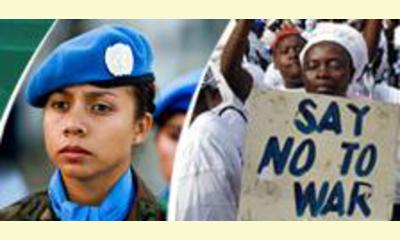|
|
Women’s Role in Peace and Security
an article by UN Women
The Security Council will convene on 30 November 2012 an Open Debate on women and peace and security with a focus on “the Role of Women’s Civil Society Organizations in Contributing to the Prevention and Resolution of Armed Conflict and Peacebuilding”.

click on photo to enlarge
The Open Debate marks an opportunity to reflect on the progress made and to accelerate action on the implementation of the Security Council’s historic resolution 1325 (2000) and related commitments and guiding documents on women and peace and security, one of UN Women’s priority areas of work.
The ground-breaking Security Council Resolution 1325, which was passed in the year 2000, is the first to link women’s experiences of conflict to the international peace and security agenda, focusing attention on the disproportionate impact of conflict on women, and calling for women’s engagement in conflict resolution and peacebuilding. It recognized the under-valued and under-utilized contributions women make to conflict prevention, peacekeeping, conflict resolution and securing peace. It also stressed the importance of women’s equal and full participation as active agents in peace and security.
Twelve years on, changes in peacemaking, peacekeeping and peacebuilding are clear. The protection of women and girls from sexual and gender-based violence is recognized as a priority challenge. Women’s peace coalitions have grown in strength.
Transitional justice mechanisms are increasingly responding to war crimes against women with specific arrangements to protect women witnesses. Post-conflict needs assessments, post-conflict planning processes and financing frameworks have in some cases acknowledged the need to put women’s participation and concerns at the center of recovery. While these changes have been critical, much more remains to be done.
In collaboration with partners, UN Women is currently supporting implementation of women, peace and security commitments in at least 37 countries. This includes support for strengthening women’s peace coalitions and to help prepare them for engagement in peace processes; work with peacekeepers to help detect and prevent conflict-related sexual violence; support to build justice and security institutions that protect women and girls from violence and discrimination; and initiatives to promote public services that respond to women’s needs, ensure women’s access to economic opportunities, and build women’s engagement in public decision-making at national and local levels.
The new report of the UN Secretary-General provides an overview of progress since last year in implementing resolution 1325 (2000) across four action areas: prevention, participation, protection and relief and recovery. The report includes updates on measures taken to improve coordination and accountability for women, peace and security, and highlights best practice examples as well as obstacles and challenges to women’s participation and representation in efforts to prevent and resolve conflict. The report shows that across regions there are a growing number of inspiring examples of women, peace and security in action but overall progress remains slow and uneven.
The Sourcebook on Women, Peace and Security is a collection of cutting-edge resources intended to raise awareness, provoke policy, support training, advocacy and share lessons learned on implementation of the women, peace and security (WPS) agenda, including the UN Security Council resolution 1325 and other women and peace and security resolutions (1820, 1888, 1889 and 1960). This collection is expected to strengthen the knowledge base on women and peace and security-related issues and to provide practitioners, advocates and policy-makers with practical guidance.
(Click here for a Spanish version or here for a French version of this article)
|








|
DISCUSSION
Question(s) related to this article:
UN Resolution 1325, does it make a difference?,
* * * * *
LATEST READER COMMENT:
A recent study by the NGO Working Group on Women, Peace and Security is critical of the UN Security Council for its inconsistent implement of Resolution 1325 that calls for an increased role of women in peacekeeping and peacebuilding. The full report is available on the Internet on the website of womenpeacesecurity.org.
The working group members are an impressive group of active international NGOs: Amnesty International; Consortium on Gender, Security and Human Rights; Femmes Africa Solidarité; Global Action to Prevent War; Global Justice Center; Human Rights Watch; The Institute for Inclusive Security; International Action Network on Small Arms; International Alert; International Rescue Committee; Refugees International; International Women’s Program of the Open Society Foundations; Social Science Research Council; Women’s Refugee Commission; Women’s Action for New Directions; Women’s International League for Peace and Freedom.
Here is the report's Summary of Findings
General trends in the Council over the last 12 years have shown significant development, including in the language and expertise on women, peace and security in resolutions, more expertise available to deploy in terms of gender advisors and women, peace and security, and a more sophisticated understanding of the key issues at the root of this agenda. There is a better understanding of, for example, what it takes to have disarmament, demobilization, and reintegration processes that are responsive to women; security sector reform that is responsive to women; and post-conflict elections that support women candidates and women voter. However, there is inconsistency in the Council’s deployment of that knowledge. There is still a significant disconnect between the content of reports received by the Council, meetings the Council holds, and resolutions it adopts.
There have been a number of positive developments in the Council’s use of women, peace and security-specific language in its policy over the last year. For the first time, for example, the Council used women, peace and security language in its resolution on Cyprus. However, there have also been inconsistencies. The Council’s initial lack of support for women in September 2011’s resolution on Libya was rectified by strong support in its March 2012 renewal. . ...more.

|
|









